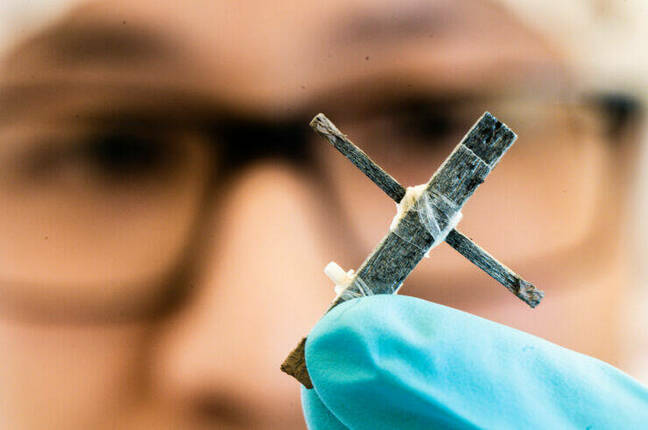Boffins claim to create the world's first wooden transistor
But don't toss out your silicon chips quite yet
Talk about branching out: Swedish researchers have built what they claim is the world's first wooden transistor.
In a recent paper [PDF], researchers from Sweden's Linköping University and the KTH Royal Institute of Technology say they've managed to build a working gate transistor shaped like a "T" from three pieces of balsa wood.
The top of the T served as the transistor channel, with a source at one end and a drain at the other, while the vertical portion of the T used two pieces of balsa with a gap between them to form the transistor's gate pieces.

A proof-of-concept transistor made of polymer-impregnated balsa wood. Source: Thor Balkhed. - Click to enlarge
Lest you assume you can head to the hobby store and rig up your own balsa wood transistor, keep in mind that order to transform plain old balsa into conductive wood, the Swedish boffins had to first expose it to heat and use chemicals to extract most of the lignin in the arboreal structural framework, leaving behind a porous cellulose block ready to be drenched in conductive polymer.
With the lignin removed, the researchers found that a water-soluble conductive polymer known as poly(3,4-ethylenedioxythiophene) polystyrene sulfonate, or PEDOT:PSS, was the best choice for the job since it behaves similarly to water and easily filled pockets in the balsa all the way down to its core.
Once filled with the polymer and assembled, the Swedish team achieved conductivity up to 69 Sm-1, and were also able to prove the device's effectiveness as a double-gate organic electrochemical transistor and functional on/off switch.
According to Linköping University, previous wooden transistors were only able to regulate ion transport, and once ions ran out they stopped functioning. That's not the case with this design, which can also function without deteriorating.
The spruce goose of supercomputers still isn't close
We all know how tiny and fast modern transistors are: They're down to single-digit nanometers in size and reach gigahertz in speeds. Organic electrochemical transistors, the closest comparable to the wood electrochemical transistor (WECT) built in Sweden, aren't nearly as small as their silicon counterparts, but are still able to reach millimeters in size with switching rates in the kilohertz.
Also, lest you think this is going to be revolutionary to the semiconductor industry, the conductive balsa wood transistor is neither small nor fast: It's a full three centimeters across and switches at less than a single Hertz. Because it's so slow it's also not able to switch off in under a second, and switching on takes a full five seconds. Not exactly supercomputing - or even pedestrian computing - speeds.
Still, the researchers said in their paper, their result "proves that it is possible to modulate the electrical conductivity of the electroactive wood by applying an external voltage."
"WECT is not suitable for conventional electronic circuits but is probably an interesting candidate for wood-integrated applications ranging from electrochromic displays to simple logic circuits responding to sensor input," the researchers said.
- AMD says transistor tech will keep Moore's law alive for 6 to 8 years
- Disruptive innovation's like a party. It's always happening elsewhere
- Graphene spintronics crowned latest Moore's Law extender contender
- The early days of PCs as seen through DEAD TREES
The team believe their conceptual device could be used in bioelectronic and plant electronics, and that they expect it to be a stepping stone toward the development of smaller, more conductive and faster devices.
Isak Engquist, senior associate professor at Linköping's Laboratory for Organic Electronics and an author on the paper, said the wood transistor wasn't created with any specific application in mind; rather it was an attempt to prove it could be done.
"We've come up with an unprecedented principle. Yes, the wood transistor is slow and bulky, but it does work, and has huge development potential," Engquist said. "This is basic research, showing that it's possible, and we hope it will inspire further research that can lead to applications in the future." ®
